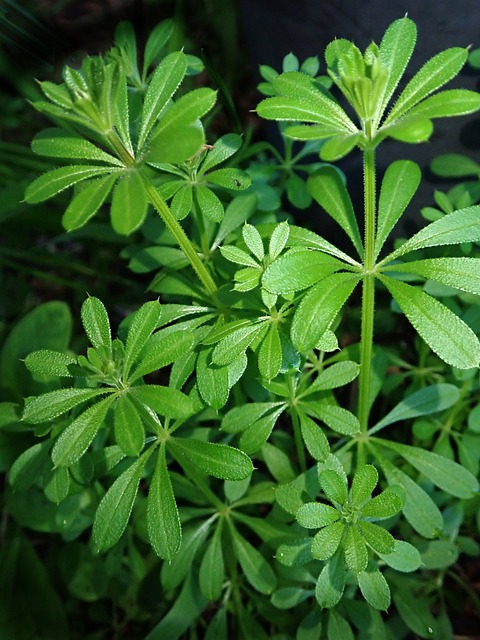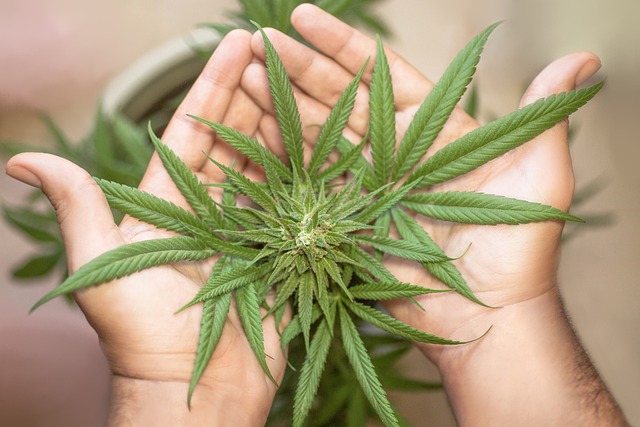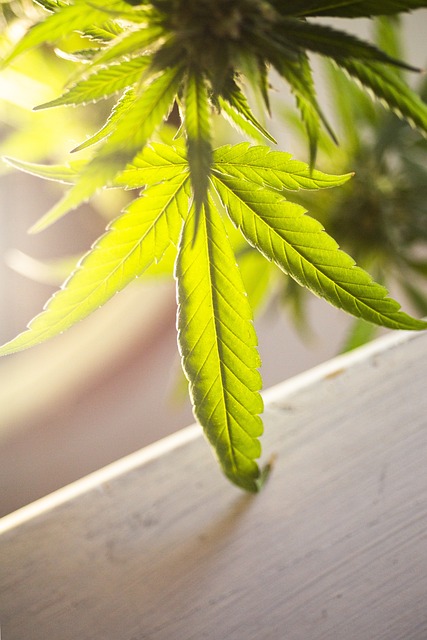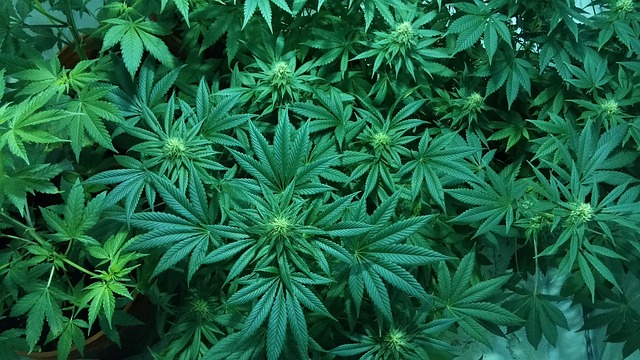
The THCA flower, rich in non-psychoactive THCA and a variety of aromatic terpenes like myrcene, caryophyllene, and limonene, is drawing scientific attention for its potential therapeutic benefits. These compounds not only contribute to the plant's flavors and fragrances but also significantly influence its effects on health, offering anti-inflammatory, analgesic, and mood-enhancing properties. The synergistic interplay between THCA and its terpene profile, known as the entourage effect, amplifies these benefits, making it a subject of interest for those seeking alternative wellness solutions. Myrcene, caryophyllene, and limonene, each with their own unique properties, work together to modulate the effects of THCA, potentially offering a wide range of health advantages without psychoactive side effects. The ongoing research aims to clarify how these terpene profiles can be optimized for maximum therapeutic benefit, highlighting the importance of the THCA flower in neuroprotection and managing various conditions such as inflammation and cognitive impairment.
Discover the multifaceted benefits of THCA flower, a non-psychoactive powerhouse within the cannabis realm. This article delves into the therapeutic properties and unique terpene profiles that distinguish THCA flower as a potential wellness ally. From its anti-inflammatory and neuroprotective effects to its role in pain management and gastrointestinal health, we explore the myriad advantages of incorporating THCA flower into your holistic routine. Join us as we navigate the science behind this natural compound, its potential for respiratory wellness, and the entourage effect that amplifies its benefits. Whether you’re a seasoned user or new to the world of cannabinoids, this comprehensive guide provides insights into the safety, cultivation, and legal considerations of THCA flower.
- Unveiling the Potential of THCA Flower Terpene Profiles
- Understanding THCA: A Precursor to CBD and THC
- The Role of Terpenes in Enhancing THCA's Effects
- Therapeutic Benefits of THCA Flower: An Overview
- Anti-Inflammatory Properties: How THCA Flower Can Offer Relief
- Exploring the Neuroprotective Qualities of THCA Flower
Unveiling the Potential of THCA Flower Terpene Profiles

Delta-9 tetrahydrocannabinolic acid (THCA) flowers are garnering attention for their therapeutic potential, with a significant focus on their unique terpene profiles. These compounds, found abundantly in cannabis and hemp plants, play a pivotal role in modulating the effects of THCA and contributing to the plant’s aromatic and flavorful characteristics. The terpene profiles of THCA flowers are complex and diverse, with each strain exhibiting a distinct blend of these organic molecules. For instance, myrcene is commonly found in high concentrations and is known for its sedative and anti-inflammatory properties. Caryophyllene offers a spicy, peppery note and possesses analgesic effects, while limonene imparts a citrusy zest and is appreciated for its mood-elevating qualities. The synergistic interaction between these terpenes and THCA can enhance or alter the cannabinoid’s efficacy, leading to a wide array of wellness benefits. Researchers are actively studying these interactions to further understand how THCA flower terpene profiles can be harnessed for optimal health advantages. As the body of scientific literature grows, so too does the appreciation for the nuanced and potent effects of THCA flowers, with their terpene-rich makeups at the forefront of this burgeoning field of study.
Understanding THCA: A Precursor to CBD and THC

Cannabis enthusiasts and researchers have long been intrigued by the potential benefits of THCA, or tetrahydrocannabinolic acid, a non-psychoactive precursor to the well-known cannabinoids CBD (cannabidiol) and THC (tetrahydrocannabinol). THCA is found in raw cannabis plants or in products that have been processed to preserve its integrity. It’s notable for its therapeutic properties, which are being studied for their effects on various health conditions. As the cannabis plant undergoes heat through a process like decarboxylation, THCA converts into THC, losing its acid form and gaining psychoactive properties. This transformation is critical in the cannabis lifecycle, highlighting the dynamic nature of cannabinoids.
The THCA flower, rich in this precursor cannabinoid, also boasts a robust terpene profile. Terpenes are aromatic compounds found in the resin of cannabis plants and contribute to the distinct flavors and aromas. They play a synergistic role with THCA, potentially enhancing its effects. The specific terpene composition of THCA-rich flowers can influence the flower’s overall therapeutic potential, offering a wide array of benefits that may include anti-inflammatory, analgesic, and even neuroprotective effects. This synergy between THCA and terpenes in the cannabis plant suggests that the entourage effect, where the collective action of cannabinoids and terpenes is greater than their individual effects, could be a key factor in understanding the full spectrum of benefits associated with these compounds.
The Role of Terpenes in Enhancing THCA's Effects

Cannabis flowers rich in THCA, or tetrahydrocannabinolic acid, possess a unique entourage effect that is largely influenced by their terpene profiles. Terpenes are aromatic compounds found in various plants, including cannabis, and play a pivotal role in enhancing the effects of THCA. These organic molecules contribute not only to the distinct scents and flavors but also to the modulation of the body’s endocannabinoid system. The specific terpene composition within the THCA flower can affect its pharmacological properties, potentially amplifying or altering the psychoactive and therapeutic effects. For instance, myrcene is known for its sedative properties and is often associated with an increased permeability of the blood-brain barrier, which may enhance the absorption of THCA into the brain. Limonene, another prevalent terpene, is linked to mood elevation and stress relief, further suggesting that the synergistic action of these compounds can influence the overall experience of consuming THCA flowers. Understanding the interplay between THCA and its accompanying terpene profiles is crucial for anyone interested in the potential therapeutic benefits of cannabis, as it can lead to more effective and tailored applications for various conditions.
Therapeutic Benefits of THCA Flower: An Overview

Delta-9-tetrahydrocannabinol (THC) is well-known for its psychoactive effects, but its raw form, tetrahydrocannabinolic acid (THCA), has been gaining attention for its potential therapeutic benefits. THCA, the precursor to THC, is found abundantly in raw cannabis flowers and possesses a distinct profile of therapeutic properties without the psychoactive impact associated with THC. Research suggests that THCA may offer analgesic, anti-inflammatory, and neuroprotective effects, making it a subject of interest for those seeking alternative health solutions.
The therapeutic benefits of THCA flower are also attributed to its unique terpene profiles. Terpenes are aromatic compounds found in cannabis that contribute to the plant’s flavor and scent, and they play a crucial role in enhancing the efficacy of cannabinoids. For instance, myrcene is known for its sedative properties, while limonene is associated with mood-boosting effects. These terpene profiles not only influence the experience of using THCA flower but also potentially amplify its therapeutic benefits. Users often report relief from various conditions, including chronic pain and stress-related disorders, thanks to these combined effects. As interest in the medicinal properties of cannabinoids and terpenes continues to grow, so does the exploration of how THCA flower can be utilized for health and wellness.
Anti-Inflammatory Properties: How THCA Flower Can Offer Relief

delta-9-tetrahydrocannabinolic acid (THCA) is the raw, non-psychoactive form of THC found abundantly in raw cannabis flowers and certain hemp varieties. Emerging research suggests that THCA flower possesses potent anti-inflammatory properties. This is attributed to its unique interaction with the body’s endocannabinoid system, particularly the CB2 receptors which play a significant role in regulating inflammation. The terpene profiles of THCA flowers are a critical factor in their therapeutic potential. Terpenes like myrcene and caryophyllene are known for their anti-inflammatory effects and can synergistically enhance the anti-inflammatory properties of THCA when consumed together, providing a comprehensive approach to inflammation relief without the psychoactive effects associated with its decarboxylated form, THC. Users seeking natural alternatives to over-the-counter anti-inflammatory drugs may find solace in the therapeutic benefits offered by THCA flower, thanks to its rich terpene composition.
Exploring the Neuroprotective Qualities of THCA Flower

THCA flower, the raw form of tetrahydrocannabinolic acid, has garnered attention for its potential neuroprotective properties. Unlike its psychoactive counterpart THC, THCA is non-psychoactive and offers a range of benefits that are increasingly being studied. The neuroprotective qualities of THCA flower stem from its complex terpene profiles, which include myrcene, caryophyllene, and limonene, among others. Myrcene, for instance, is known for its anti-inflammatory effects and may contribute to the brain’s protective barriers, potentially aiding in neurodegenerative diseases. Caryophyllene offers two distinct types, alpha and beta, each with their own therapeutic properties, including anti-anxiety and anti-inflammatory benefits. These terpenes work synergistically within the endocannabinoid system, influencing receptor activity and modulating neurotransmitter release, which can be beneficial for maintaining brain health.
Furthermore, the THCA flower’s interaction with the body’s ECS suggests a possible role in promoting healthy neural function and protecting against oxidative stress, a common contributor to cognitive decline. The entourage effect, where the combined effects of cannabinoids and terpenes are greater than any single compound, is particularly relevant here. This synergy could be key in understanding how THCA flower might support brain health over time, offering a natural alternative for those seeking neuroprotective benefits without psychoactive side effects. As research continues to evolve, the potential applications of THCA flower’s terpene profiles for cognitive well-being are becoming increasingly clear.
THCA flower terpene profiles emerge as a significant area of interest within the cannabinoid realm, offering a myriad of therapeutic benefits. This exploration has shed light on how THCA, a non-psychoactive precursor to CBD and THC, interacts with our endocannabinoid system, particularly through its synergistic relationship with terpenes. The potential health advantages of THCA flower, including its anti-inflammatory and neuroprotective properties, suggest a promising avenue for natural therapeutic support. As the scientific community continues to unravel the complexities of cannabinoids and terpenes, the use of THCA flower may become a staple in holistic health practices.







